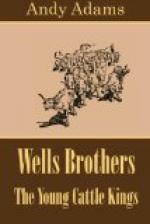Mr. Lovell turned to the boys. “The five horses are yours. But I’m still in your debt. Is there anything else that you need?”
The question was repeated to Forrest. “By the time the herds reach here,” said he, mildly observant, “there will be quite a number of tender-footed and fagged cattle. They could never make it through without rest, but by dropping them here, they would have a fighting chance to recuperate before winter. There won’t be a cent in an abandoned steer for you, but these boys—”
“Trim the herds here on the Beaver,” interrupted Mr. Lovell. “I’ll give all my foremen orders to that effect. Cripples are worthless to me, but good as gold to these boys. What else?”
“Oh, just wish the boys good luck, and if it ever so happens, speak a good word for the Wells Brothers. I found them white, and I think you’ll find them on the square.”
“Well, this is a happy termination,” said Mr. Lovell, as he alighted at the tent. “Our water expense between Dodge and Ogalalla will not exceed five thousand dollars. It cost me double that getting out of Texas.”
Secure on the Beaver, the brothers were unaware of the outside drouth, which explained the failure of the herds to appear on the trail as in other years. It meant the delay of a fortnight, and the concentration of a year’s drive into a more limited space of time. Unconscious of its value, the boys awoke to the fact that they controlled the only water between the Prairie Dog and the Republican River—sixty miles of the plain. Many of the herds were under contract and bond to cattle companies, individuals, army posts, and Indian agencies, and no excuse would be accepted for any failure to deliver. The drouth might prove an ill-wind to some, but the Beaver valley was not only exempt but could extend relief.
After supper, hosts and guests adjourned to the tent. Forrest had unearthed the winter struggle of his proteges, and gloating over the manner in which the boys had met and overcome the unforeseen, he assumed an observant attitude in addressing his employer.
“You must be working a sorry outfit up on the Little Missouri,” said he, “to lose ten per cent of straight steer cattle. My boys, here on the Beaver, report a measly loss of twelve head, out of over five hundred cattle. And you must recollect that these were rag-tag and bob-tail, the flotsam of a hundred herds, forty per cent cripples, walking on crutches. Think of it! Two per cent loss, under herd, a sleet over the range for six weeks, against your ten per cent kill on an open range. You must have a slatterly, sore-thumbed lot of men on your beef ranch.”




